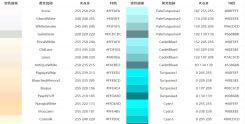- 欢迎使用千万蜘蛛池,网站外链优化,蜘蛛池引蜘蛛快速提高网站收录,收藏快捷键 CTRL + D
谷歌蜘蛛池域名(360搜索引蜘蛛)
如何使用SEO技巧优化谷歌蜘蛛池域名和360搜索引蜘蛛?

优化谷歌蜘蛛池域名:
- 使用谷歌搜索控制台将网站提交给谷歌,并配置sitemap
- 创建高质量的内容,使搜索引擎容易抓取并理解
- 构建良好的内部链接结构,使搜索引擎易于导航和查找页面
- 确保网站速度快,并且是基于HTTPS的安全网站
优化360搜索引蜘蛛:
- 使用360站长平台将网站提交给360,并提交sitemap
- 创建优质的内容,并且避免使用太多的广告或内容镶嵌
- 使用360站长平台查看响应码404,并尽快修复死链和缺失页面
- 保证网站速度快,且用户体验好,下载速度快
使用竞争情报改善SEO优化策略:
1. 分析对手的关键字:
- 使用Google关键字规划工具,揭示对手在谷歌上的关键字使用情况和搜索量,制定关键字策略。
- 使用SEMrush等工具,获得对手的关键字排名和流量数据,并审查对手的关键字策略。
2. 分析对手的内部链接结构:
- 运用Ahrefs,在网站上抓取所有网址,并且查看它们之间的链接。
- 查看对手的网站结构,了解它们是如何组织内容的,并且优化自己的网站结构。
3. 分析对手的外部链接结构:
- 使用Majestic等工具,查看对手的外部链接情况,并找出对手的一些高质量的链接资源。
- 找到对手使用的一些关键字,并在竞争网站中查找类似的资源。
- 建立自己的外部链接策略,以获得更多的链接。
4. 分析对手的网站流量:
- 使用Alexa等工具,查看对手的整体流量和来源,了解用户搜索和购买行为,并制定自己的流量增长计划。
- 检查对手在社交媒体和其他数字渠道的活动,以及如何吸引流量。

使用元标签来优化网站:
1. Title标签:
<title>谷歌蜘蛛池域名 - 360搜索引蜘蛛 - 网站SEO优化 | 网站名称</title>
2. Meta Description标签:
<meta name="description" content="这里填写网站描述,不要超过160个字符" />
3. Meta Keywords标签:
<meta name="keywords" content="网站关键字, 关键字, 谷歌蜘蛛池域名, 360搜索引蜘蛛" />
4. Meta Robots标签:
<meta name="robots" content="index,follow" />
5. Canonical标签:
<link rel="canonical" href="https://你的网址" />
6. Open Graph标签:
<meta property="og:title" content="网站标题" />
<meta property="og:description" content="网站描述" />
<meta property="og:url" content="https://你的网址" />
<meta property="og:image" content="https://你的网址/图片.jpg" />
7. Twitter标签:
<meta name="twitter:title" content="网站标题" />
<meta name="twitter:description" content="网站描述" />
<meta name="twitter:url" content="https://你的网址" />
<meta name="twitter:image" content="https://你的网址/图片.jpg" />
使用结构化数据来增强网站可见性:
1. 域名:
<script type="application/ld+json">
{
"@context": "https://schema.org/",
"@type": "WebSite",
"name": "网站名称",
"url": "https://你的网址"
}
</script>
2. 文章:
<script type="application/ld+json">
{
"@context": "https://schema.org/",
"@type": "Article",
"headline": "文章标题",
"image": "https://你的网址/图片.jpg",
"author": {
"@type": "Person",
"name": "作者姓名"
},
"publisher": {
"@type": "Organization",
"name": "网站名称",
"logo": {
"@type": "ImageObject",
"url": "https://你的网址/Logo.png",
"width": 600,
"height": 60
}
},
"url": "https://你的网址/文章URL.html",
"datePublished": "2022-01-01T00:00:00+00:00",
"dateModified": "2022-01-01T00:00:00+00:00",
"description": "这里填写文章描述"
}
</script>
3. 产品:
<script type="application/ld+json">
{
"@context": "https://schema.org/",
"@type": "Product",
"name": "产品名称",
"image": "https://你的网址/产品图片.jpg",
"description": "这里填写产品描述",
"sku": "产品SKU",
"brand": {
"@type": "Thing",
"name": "品牌名称"
},
"offers": {
"@type": "Offer",
"priceCurrency": "USD",
"price": "120.00",
"priceValidUntil": "2023-01-01",
"availability": "http://schema.org/InStock",
"url": "https://你的网址/产品URL.html"
}
}
</script>
4. 本地企业信息:
<script type="application/ld+json">
{
"@context": "https://schema.org/",
"@type": "LocalBusiness",
"name": "企业名称",
"image": "https://你的网址/企业Logo.png",
"telephone": "电话号码",
"address": {
"@type": "PostalAddress",
"streetAddress": "企业地址",
"addressLocality": "所在城市",
"postalCode": "邮政编码"
},
"url": "https://你的网址",
"priceRange": "$$",
"openingHoursSpecification": {
"@type": "OpeningHoursSpecification",
"dayOfWeek": [
"Monday",
"Tuesday",
"Wednesday",
"Thursday",
"Friday"
],
"opens": "08:00",
"closes": "18:00"
},
"geo": {
"@type": "GeoCoordinates",
"latitude": "纬度",
"longitude": "经度"
},
"sameAs": [
"https://twitter.com/你的twitter",
"https://www.facebook.com/你的facebook",
"https://www.instagram.com/你的instagram",
"https://www.linkedin.com/你的linkedin"
]
}
</script>
创建高质量内容,提高搜索引擎排名:
1. 标题:
<h1>文章标题</h1>
2. 子标题:
<h2>子标题</h2>
3. 文章段落:
<p>这里填写文章段落内容</p>
4. 列表:
<ul>
<li>列表项1</li>
<li>列表项2</li>
</ul>
5. 图片:
<img src="https://你的网址/图片.jpg" alt="图片描述" />
6. 链接:
<a href="https://你的链接" target="_blank">链接文本</a>
7. 强调:
<em>这里是强调文本</em>
8. 着重:
<strong>这里是着重文本</strong>
9. 代码块:
<pre>
<code>这里是代码块</code>
</pre>
10. 长尾关键字:
<p>这里使用长尾关键字,从而提高搜索引擎排名</p>









